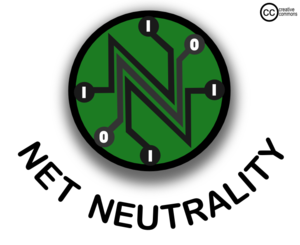 In case the news had slipped through your sights, the FCC’s possible plan on regulation regarding Net Neutrality was leaked to the Wall Street Journal on Friday (or read the NY Times coverage), and this plan, on the surface, seems like it might make everyone happy in the long run.
In case the news had slipped through your sights, the FCC’s possible plan on regulation regarding Net Neutrality was leaked to the Wall Street Journal on Friday (or read the NY Times coverage), and this plan, on the surface, seems like it might make everyone happy in the long run.
Of the over one million comments sent to the FCC during the open comment period, it could safely be said that a large majority of them were pleas that the FCC just reclassify the internet as a Title II resource, putting it in the same classification as the telephone system and making it subject to heavy regulation. I am well aware that I am in the minority on this subject because I don’t believe that reclassifying to Title II will solve all the issues that we could face in regards to the access that people have to the internet.
The plan that was leaked on Friday seems intended to be an effort at a compromise, while simultaneously creating a whole new world of issues all its own. It appears the FCC believes the answer is to protect the internet business and give the Internet Service Providers (ISPs) control over the connection in that ‘last mile.’
Sawing The Thing In Half
The plan that Chairman Wheeler is considering would effectively divide the internet into two tiers. Instead of one tier being a paid priority fast lane and the other a hypothetical a slow lane, we could possibly have,
“a retail one, in which consumers would pay broadband providers for Internet access; and a back-end one, in which broadband providers serve as the conduit for websites to distribute content. The FCC would then classify the back-end service as a common carrier, giving the agency the ability to police any deal between content companies and broadband providers.”
What did he say in non-legalese? Effectively, the ISPs are going to be more heavily regulated, but not at the consumer end. Instead, the ISPs are going to have stronger government oversight when it comes to the content providers’ ability to transport signal on to the ISP’s networks. This, effectively, means the death of the fast lane concept as policy because unless a reason for prioritized content could be proven just and reasonable, it would be restricted.
 However, what does that mean for the retail internet regulation being discussed? When I first started reading these policies I was very confused because of the selection of terminology. When I think retail, I think of an exchange between a customer and a business. As much of the internet traffic these days is an exchange of money for media or goods, I took retail as the protection for the consumers to have access to all data equally. In effect, that’s what the back-end part of the proposal is, except it isn’t that the consumer will have access to it equally, but instead, the ISPs must treat all content providers data traffic equally.
However, what does that mean for the retail internet regulation being discussed? When I first started reading these policies I was very confused because of the selection of terminology. When I think retail, I think of an exchange between a customer and a business. As much of the internet traffic these days is an exchange of money for media or goods, I took retail as the protection for the consumers to have access to all data equally. In effect, that’s what the back-end part of the proposal is, except it isn’t that the consumer will have access to it equally, but instead, the ISPs must treat all content providers data traffic equally.
This means that the transition of data from the ISP to the consumer would still not be under heavy regulation and is subject to the ISPs control. In the most blunt terms possible, the ISPs will still be the sole proprietor of the ‘last mile,’ or the connection to your home and not subject to the heavy regulation that was being sought to protect consumers.
The FCC’s mission, as specified in Section One of the Communications act of 1934, is stated as the following: to “make available so far as possible, to all the people of the United States, without discrimination on the basis of race, color, religion, national origin, or sex, rapid, efficient, Nation-wide, and world-wide wire and radio communication services with adequate facilities at reasonable charges.” So why is it that this proposal being considered is protecting the ISPs and not the consumers?
Vanishing Into Thin Air
Let’s bring this back around to the AV side of the discussion, as I have focused on throughout the year. How will these new regulations alter the landscape in terms of our ability to access equipment remotely via VPN? Will these regulations create problems for the video conferencing and unified communications capabilities of our systems?
To answer the second question first, yes. The FCC is looking at content providers as the websites like Netflix, YouTube, Google, and Amazon but is ignoring the other ways that content is generated. Because your video conferencing system is an end point device that would be communicating directly with other end point devices, it is unlikely that it would be treated with the heavy regulation that is being described for the content providers.
 However, what about all the cloud based conferencing solutions offered from companies like BlueJeans, GoToMeeting, Lifesize, Skype, or even Google Hangouts? Would these be treated differently because they are based on logging in to a hosted website location to be the source of content creation? Under the language of this plan currently available for viewing, yes, that is exactly the case. The FCC just may have accidentally rung a death bell for hardware in the unified communications and collaboration markets. Unless, of course, you are using that hardware through one of the protected content providing sources.
However, what about all the cloud based conferencing solutions offered from companies like BlueJeans, GoToMeeting, Lifesize, Skype, or even Google Hangouts? Would these be treated differently because they are based on logging in to a hosted website location to be the source of content creation? Under the language of this plan currently available for viewing, yes, that is exactly the case. The FCC just may have accidentally rung a death bell for hardware in the unified communications and collaboration markets. Unless, of course, you are using that hardware through one of the protected content providing sources.
Getting back to the first question, though, will this affect the AV community’s ability to take advantage of networks to remotely access their equipment? This part is unlikely. As the regulations are geared towards the content creators and do not appear, at this time, to be altering the access to available bandwidth, this should not be a problem.
We, as AV professionals, would be logging in through a private network connection in order to update firmware, parameter files, or just troubleshoot existing hardware. As that would be a privately owned network, we would only be subject to any issues that would come from unregulated ‘last mile’ access from the ISPs. But given that it is in the ISPs best interest to ensure that their networks function for commercial and residential customers without fail, I can’t see our ability to remotely communicate with our systems being an issue if this new plan comes to fruition.
The Only Show In Town
Is there any other speculative problem that could occur given the proposed circumstances? Just one major one that I have mentioned previously if we were to go the route of Title II: improvement and expansion of the network infrastructure. In order for ISPs to be incentivized to improve and expand their existing network infrastructure, they have to get something out of it. As the heavy regulation is coming on the input side of the network (from content providers), I don’t see any reason why the ISPs would be motivated to improve the quality and reach of their network for the consumers.
The availability of broadband networks to the rural areas of the United States is still minimal at worst and monopolistic at best. Where in this plan are these businesses getting the push that expanding and improving their network will benefit them from the stand point of a bottom line? As they are for-profit businesses, unless the companies have reason to, or the overall regulation is so heavy and the government subsidies offered are requiring oversight for the improvement of these networks, I still find it highly unlikely that we’ll see expansion of the broadband capabilities in rural areas of the country.
Chairman Wheeler is caught between a mob and a money pit in this case. With a record setting number of individuals offering their comments on the matter, he has an appointed responsibility to protect public interests. But the ISPs have proven they are willing to spend the money on congressional contributions to ensure they have the regulatory support on Capitol Hill to protect their interests. If Mr. Wheeler gives in to the mob, the matter will be tied up in courts by the ISPs. If Mr. Wheeler gives in to the money pit, public interest groups will tie the matter up in courts.
Either way, I would expect the next result in this matter to see the inside of a courtroom with the ultimate question continuing to loom over us all. Is there a way for public interest and profitable business to find a way to co-exist on this matter?





Pingback: Net Neutrality: The Pieces Align | Sound ReasonSound Reason